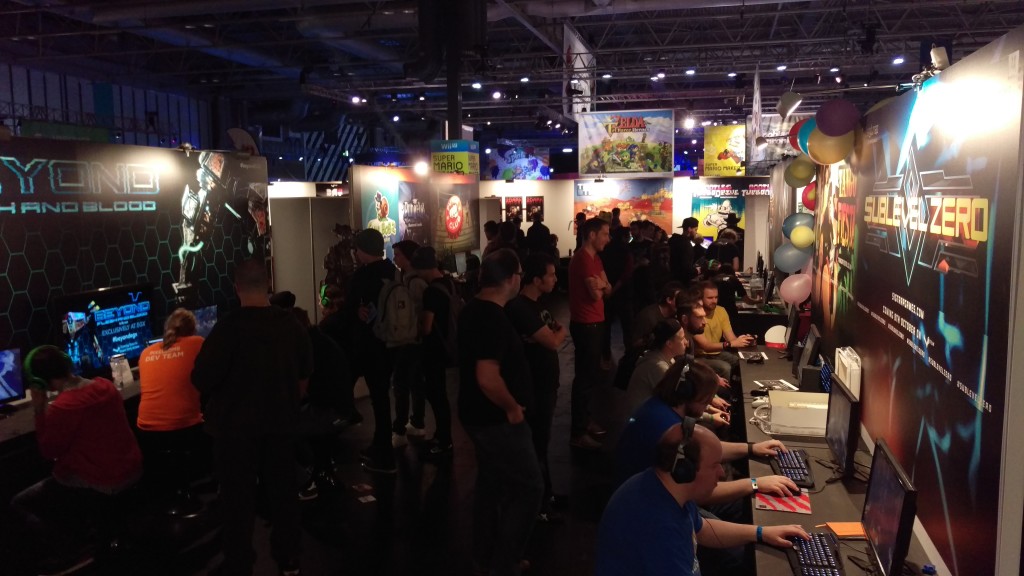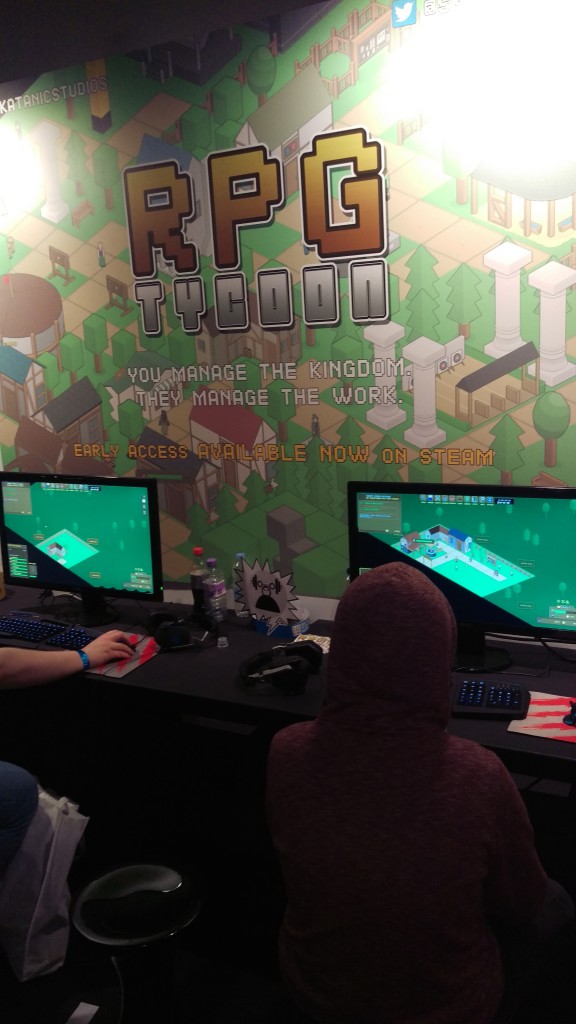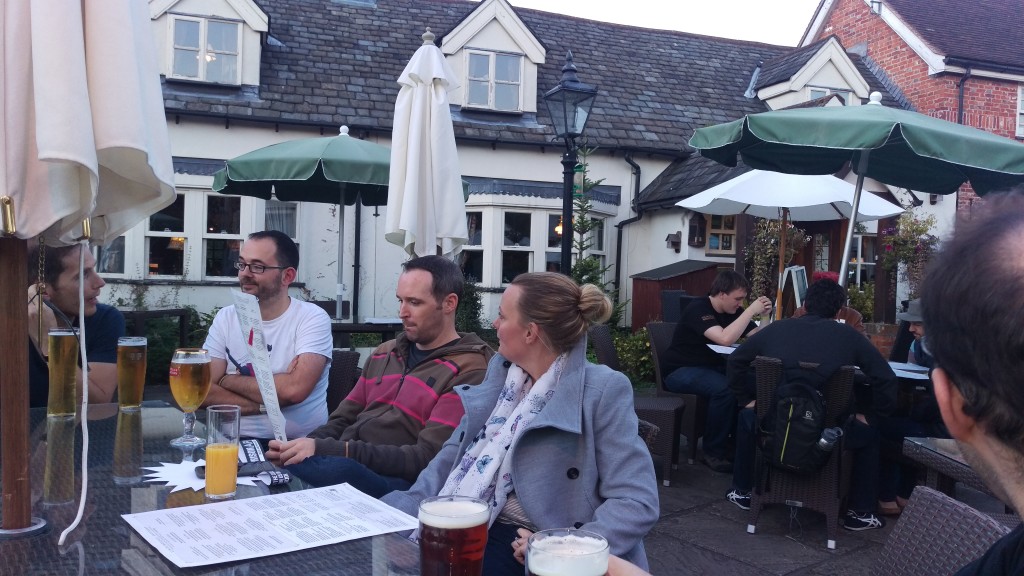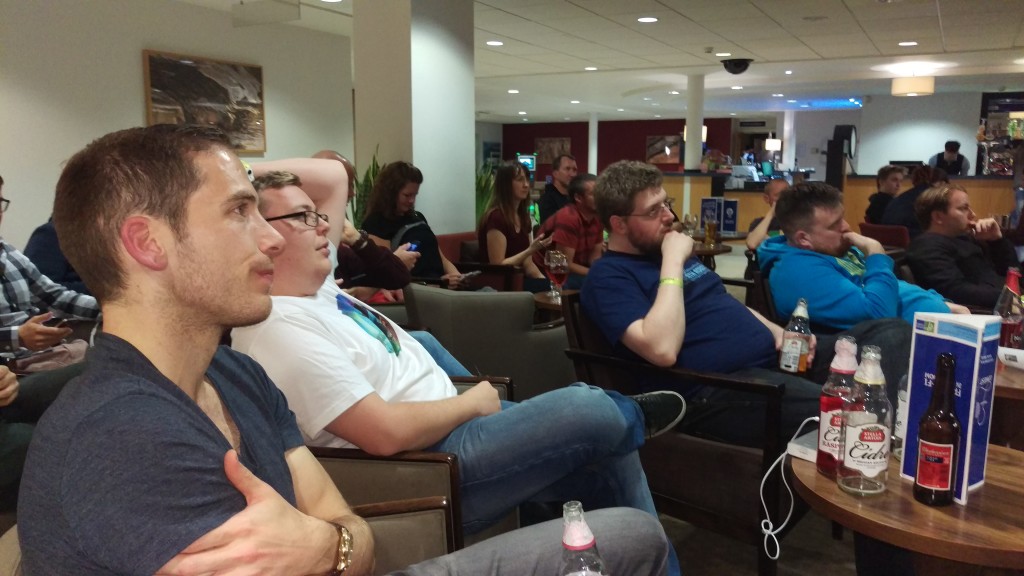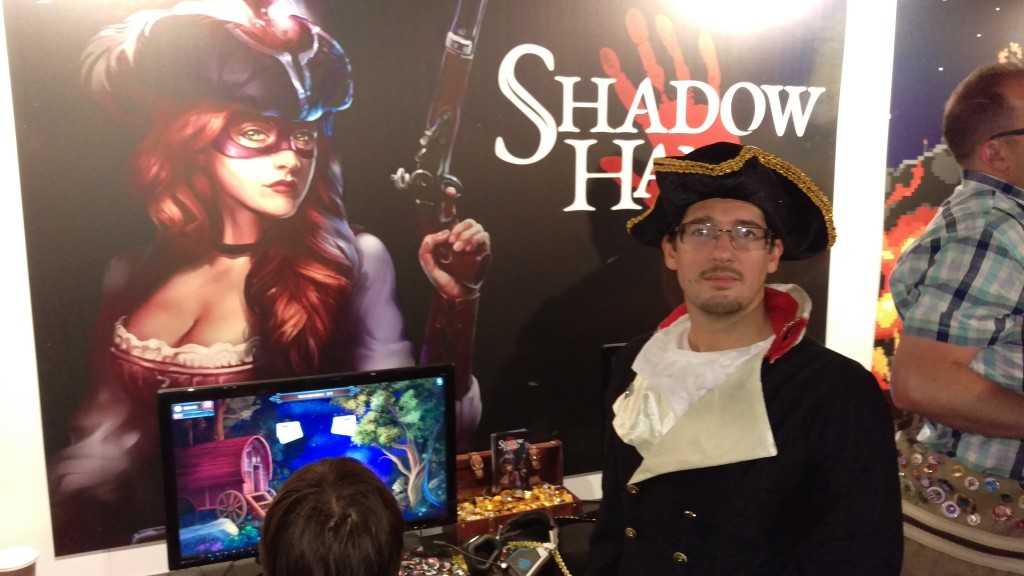As some of you may know, I spent the past weekend at EGX 2015 at the NEC in Birmingham showing off the latest build of RPG Tycoon to members of the public. This has been the fourth convention I’ve shown the game at this year and I just wanted to take the time to write a brief overview of my experience of the weekend. I guess it’s important to mention that I’ve not been doing this very long, as this is my first commercial project and my first experience of events like this within the industry, so obviously a lot of this is subjective, but having spoken to a few other developers at these shows about the topic I’m hoping that what I have to say is mostly accurate to indie developers as a whole and at least gives a basic overview to any aspiring indie developer about just what to expect from exhibiting and what you may, or may not, get out of presenting yourself and your work at a convention
If you’re thinking about going to an event just to make sales and make a load of money because you’re putting it in front of people, you’ll probably leave disappointed.
Unless you have some crazy huge marketing budget or can get the space for free, it probably won’t translate as well as you think. Don’t get me wrong, if you’re in early access or your game is fully released, you WILL make sales and you probably will see a small spike during the shows but it’s incredibly unlikely that you’ll make a profit on the overall expense of one of these events. It’s a much slower burn. What’s important about it, is impressions. Advertisers always talk about impressions and it’s for a reason.
As soon as somebody sees anything to do with your product, that’s an impression.
I had so many people come up to me this weekend and mention how they’d never heard of the game and I’d overhear people walking past the stand and stare up at the banner, quoting the name “RPG Tycoon”. These are impressions. That banner/flyer or simply by seeing someone else play it as they walk past has indirectly made an impact on them and a small number of them will hopefully recognise it the future, possibly translating to a sale as and when they see it again (on the steam store or otherwise).
(Who knows? Maybe you’re reading this and never heard of the game before EGX.)
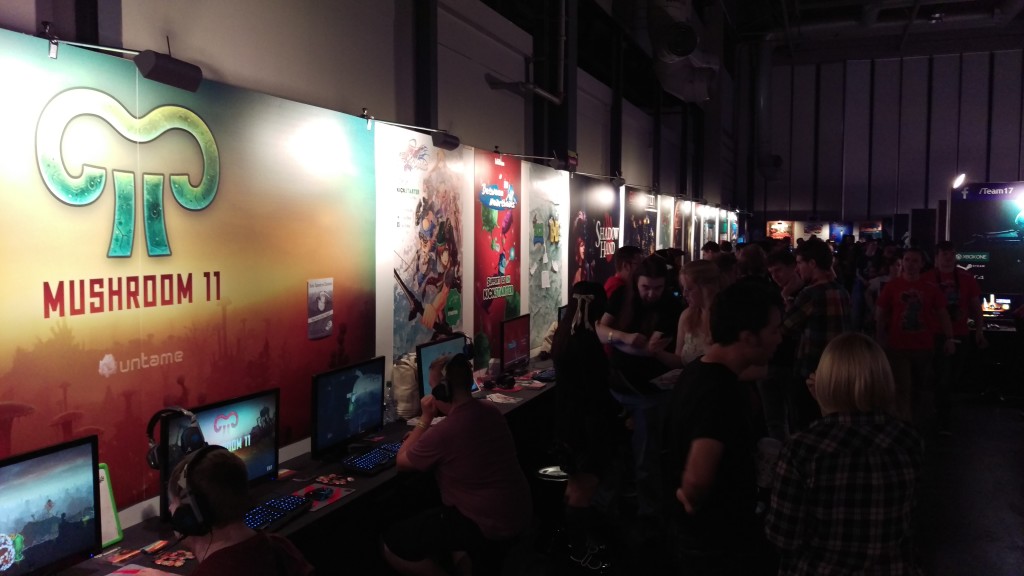
Leaflets are a really good way to get information about your game across to people while they’re waiting to have a go on it.
At Rezzed I had a single page A5 leaflet to advertise the game with some art on and directions to the stand. This worked, but was treated more like a flyer to spread the word about me being at the expo as we handed it out to people walking past the stand and had no real other purpose. The issue with this is that people will often just take something out of politeness. What I think was more effective and a much better way to handle it, is to create an actual booklet, a simple two page folded leaflet with some copy (a description about the game / features list) and a few screenshots. That way people can pick it up while they are watching people play and find out more about the game. I had a huge pile on the table next to the monitors each day and many people stood watching would pick one up and give it a read while they watched people play to understand it. It really helped convey the game, without forcing them to wait to try it out and saved me or anyone else on the stand having to talk to absolutely everyone to try and sell it to them. Compared to the leaflets I used at Rezzed, people reading / taking the booklet style leaflets were much more engaged with the game at the show, I’d highly suggest it and I’ll be using this type of leaflet for any event I take a game to in the future.
For me as a developer, it’s invaluable watching people play the game because it helps you validate any assumptions you may have. The build I’d taken to EGX was brand new and previously unreleased, I’d had a bunch of new features I’d been working on for the past six weeks to try an improve usability, accessibility and overall pick up and play-ness. So I wanted to test out how people would react to it. The game was much further along than the build I took to Rezzed earlier in the year, where I’d have to stand over the shoulder of anyone playing and guide them through it from time to time. Whereas now, I wanted the game to be at a point where people could figure out for themselves based on the design improvements I’d added to the game since then.
Response, overall seemed mostly positive and it’s helped me get an idea of how REAL people react to the game. I’ve been really pleased with how well people respond to the new changes to the quest systems and how many people became really invested in growing and improving their kingdoms, it’s so rewarding to see people respond positively to something you’ve poured your heart into for almost a year and a half.
I also think that one the biggest benefits to doing an event like this is just how many people you meet and speak to. When I was exhibiting at Rezzed and showing RPG Tycoon off for the first time, I was so scared that I’d be shouting above the noise, fighting for attention and no body would end up playing it.
I soon discovered that most people making games also absolutely love PLAYING them.
So very quickly, after initial set-up people were introducing themselves and asking to try the game out as I equally wandered around asking to check out everyone else’s work. Before the show had even started, I’d made friends with half of the teams in the “Indie Room” of Rezzed and we were sharing experiences of development and giving each other tips and feedback about their games. As a fresh indie, I’d gone from knowing absolutely no-one in the industry to making friends with a group from Brighton and various others across the country. I had my foot in the door and meant that when I got back home, back to developing on my own, I had a few people I could seek to talk to and get advice from and similarly, they could do the same. Everyone has something to offer, I learned very quickly that the indie games scene is focused on talent and focused on sharing that talent.
In fact, this time around I caught some familiar faces. I’d had Tom Pickard from Knifey Spoonie Games and his business partner Julian McKinlay helping me out on the booth – both of whom I’d met at Rezzed and have been incredibly supportive of me and my work since.
(It’s always important at a big show like this to have someone to help you out, just to give you a break and a chance to grab a coffee and a breath of fresh air.)
Then there was Christo from Polygrammatic who had his game Super Mix Tape on display, back at Rezzed he was in a small space with his University showing off a prototype and getting careers advice. When I first booked onto the show, I remember him contacting me asking loads of questions about it and what he should do to get himself there. I turned up to set up on Wednesday and there he was with a double booth and a polished demo of his game, I was incredibly excited for him and anytime I caught up with him during the show he’d seemed to be getting a lot of great attention, which is always awesome to see. A few other familiar faces such as the guys from Resonance Games (Starship Mechanic), Sileni Studios (Mayan Death Robots) Psytec Games (Crystal Rift) Flix Interactive (Eden Star) and plenty others that were great to catch up with and see how far they’d come over the past few months. There’s absolutely too many to name, but it was great seeing you all again!
Just going through how many cards I’ve swapped with people this weekend I’ve made so many new connections. I really can’t stress how useful it is to meet other developers and hang out with them face to face. Because events like this are huge, it’s highly probable that you’ll be sharing whatever accommodation with other developers at the event. So be friendly and say hello! We had the pleasure of running into the Mastertronic Team again, meeting Spilt Milk Studios and some other members from Sigtrap Games over breakfast the first morning. It was great getting to know them over the weekend, often sharing drinks in the evenings and coming up with crazy game ideas. (As you do). Spilt Milk were celebrating the launch of their top down shooter Tango Fiesta, which if you’re into 80’s cliches and terrible puns like me, you should definitely pick up. There were memorable incidents of jokes over the weekend with an “air horn” app and a situation involving unsliced Pizza from Dominos.
Weirdly you also manage to meet people you’d never thought you would. I’d picked up a game a few years ago called Dead Pixels, a side-scrolling zombie shooter by CSR Studios. I was a big fan of it and Jon was here showing off the sequel, which I’d been following for a while now and finally had a chance to play. As a fellow one-man team we both shared our experiences of doing it solo getting to know a bit more about each others workflow while jokingly discussing other abstract “Tycoon” ideas that I should make next. (I think his best suggestion so far was Tycoon Tycoon, a very meta game based around making Tycoon games.) I also met Jake Birkett of Grey Alien Games who alongside his wife, both dressed in full late Baroque era atire, were showing off their new game Shadow Hand – It’s a mashup of RPG and a Card Game and part prequel to their just released Regency Solitaire. The demo was super polished and I was incredibly impressed with it. Again, we spoke throughout the show about our experiences and shared advice between one another (sensing a pattern here?). It was a pleasure to get to know him a bit and I’m very much looking forward to hopefully seeing more of the game as it progresses.
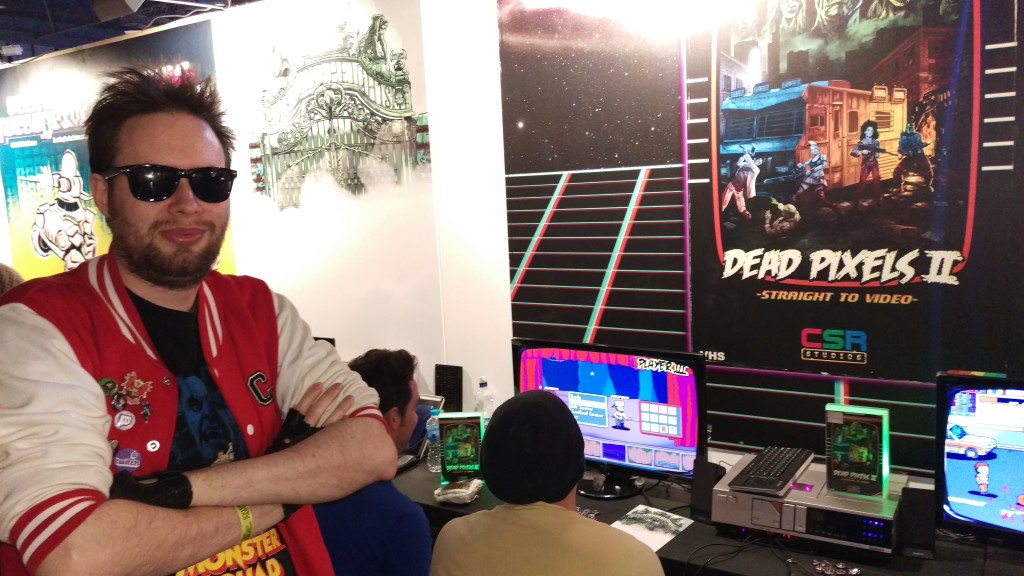
The highlight of the show for me however, has to be meeting Guy Simmons, one of the developers that has worked on a number of games that were a huge part of my childhood and essentially influenced the development of RPG Tycoon such as Theme Park and Startopia. It was an absolute honour to have him come over to the booth and ask about the game with kind words that certainly left me smiling.
It’s tough sometimes, as a “creator” working on something for so long. You often question yourself a lot with the decisions you make. You’re always curious if anyone is going to like what you produce and there’s often long nights of a lot of work with very little visible reward. It’s the feedback, the good times and the reaction you get from events like this that often help ground you again and remind you why you’re so glad to be making games for people.
Thanks to absolutely everyone that I’ve met over the past weekend and any previous events, thank you to everyone that’s purchased the game so far and any of you that’s been following the development and plan to pick it up in the future. I really couldn’t do it without you guys and I’m so happy to be part of this amazing community of passionate, smart and talented individuals.
It’s a good time to be part of this industry and I hope that I’m able to continue being a part of it for a hell of a lot longer. You’re all awesome!
I guess I should probably focus on getting this game finished now.
Matt.
